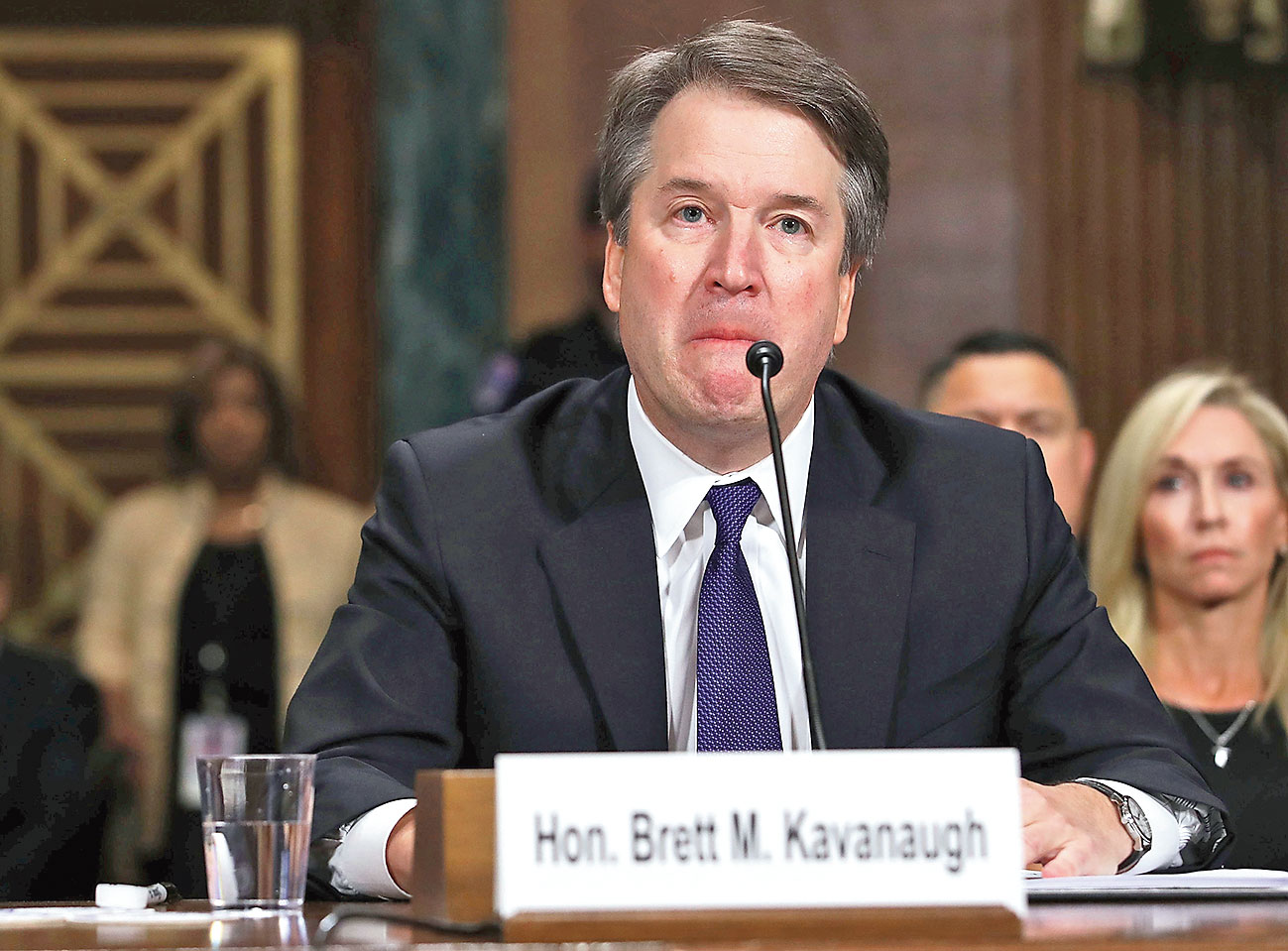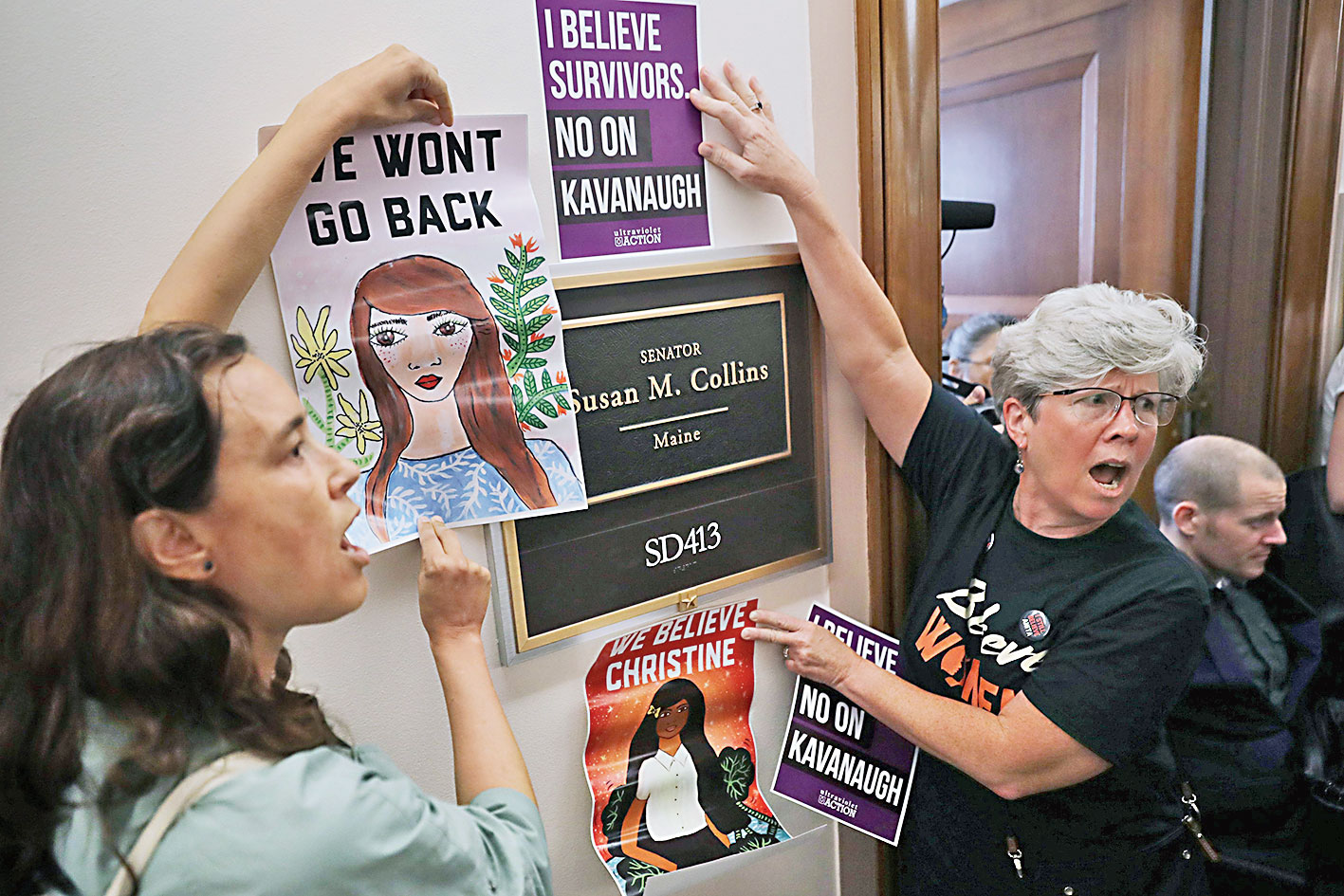By the time Brett Kavanaugh completed his angry, tearful, sniffling defence of his integrity and his high school past and finished answering the questions that it provoked, it was hard to believe that anyone could have watched that near-parodic performance of outraged entitlement without agreeing with everything that Christine Blasey Ford had said. As several commentators pointed out, it was the series of lies Kavanaugh produced on demand about teenage drinking, about the meanings of terms like the ‘Devil’s Triangle’ (a term for triangular sex that Kavanaugh passed off as a drinking game), ‘boof’ (substance abuse via the rectum which Kavanaugh spun as farting), his glib mistranslation of a sexual slur about a classmate, his ludicrous assertion that he hadn’t watched his accuser testify before the judicial committee, that disqualifies this jowly Ananias from a lifelong appointment to America’s highest court. This melodrama deserves a Broadway musical; The Hippo and the Hippocampus, perhaps, since it came down to whose memory you trusted and no one (apart from Trump) publicly cast doubt on Ford’s good faith.
The controversy and Kavanaugh’s elevation to the Supreme Court despite it, forces everyone, liberals and conservatives alike, to confront the near-sacred principle that underwrites our legal systems, the notion that an accused person is innocent till he or she is proved guilty. The presumption of innocence, the burden of proof, guilt beyond reasonable doubt, these are phrases we know by heart because they lie at the heart of our definition of justice, specially criminal justice. Kavanaugh’s critics have argued that the standard of evidence for a judicial appointment ought not to be the same as that in a criminal trial and they are right. But it would be disingenuous to deny that ‘Me Too’ and several other subaltern movements are asking for the burden of proof to be shifted to some degree from vulnerable accusers to the privileged accused because, given the way in which the justice system works in practice, the presumption of innocence becomes, too often, a presumption of impunity.
It should be possible for a liberal to defend the presumption of innocence in good faith. In fact it would be a strange liberal who didn’t uphold the principle as one of our most fundamental defences against arbitrary arrest and imprisonment. William Blackstone’s rendering of this principle has become a kind of piety: “...the law holds it better that ten guilty persons escape, than that one innocent party suffer.” The problems with this formulation begin when the ten guilty persons who escape conviction aren’t random individuals but members of a privileged class. When the law chronically allows guilty elites, variously defined, to escape punishment because the burden of proof is too heavy for vulnerable subalterns to shoulder, either because the nature of the alleged crime makes it impossible to meet the standard of proof required by criminal law or because social and economic inequality leaves them at a disadvantage when they confront powerful individuals or groups, it is then that the presumption of innocence begins to seem like a licence to run amok. This shouldn’t be hard for Indians to acknowledge: the impunity with which rich young yahoos in large cars run over and kill the pedestrian poor is an obvious example of the way in which the presumption of innocence becomes a get-out-of-jail card for the powerful.
There are at least two laws in the Indian Penal Code that lighten the burden of proof. Section 304B which pertains to dowry deaths lays down that “Where the death of a woman is caused by any burns or bodily injury or occurs otherwise than under normal circumstances within seven years of her marriage and it is shown that soon before her death she was subjected to cruelty or harassment by her husband or any relative of her husband for, or in connection with, any demand for dowry, such death shall be called ‘dowry death’, and such husband or relative shall be deemed to have caused her death”. So if the conditions laid down by this law are met, the court effectively assumes that the married woman’s husband and his relatives are complicit in killing her. The reference to burns is significant; in the 1980s there was a series of deaths reported where young married women died of burns sustained in kitchen ‘accidents’. The reason these murders could be passed off as accidents was because the domestic situation — a young woman living with her husband and her parents-in-law — made it near-impossible to get eye-witness accounts that disproved beyond reasonable doubt the convenient argument that a woman labouring at a gas stove could catch fire on account of carelessness, not conspiracy.
The second law that attenuates the presumption of innocence is the Scheduled Castes and the Scheduled Tribes (Prevention of Atrocities) Act, 1989 under which people accused of atrocities against Dalits and tribal people were liable to automatic arrest and denial of bail. The Supreme Court, earlier this year, ruled against automatic arrests and introduced a provision for anticipatory bail. There were widespread protests against this dilution of the original provision, forcing the National Democratic Alliance government to file a review petition which the apex court turned down. Nervous about alienating Dalit support, the government steered the scheduled castes and the scheduled tribes (prevention of atrocities) amendment bill, 2018 through Parliament which explicitly ruled out anticipatory bail.
The Bharatiya Janata Party’s own leadership is clearly ambivalent about the amendment; Shivraj Singh Chouhan, the chief minister of Madhya Pradesh, declared publicly that he wouldn’t allow the amended law to be ‘misused’ in Madhya Pradesh and that there would be no arrests without prior investigation. The BJP’s anxiety about not alienating its savarna and other backward classes constituencies while holding on to the votes of Dalits explains the mixed and contradictory signals its leaders have sent out about the law, but the broader point is that this provision of the law, like the law about dowry deaths, tries to address the criminal abuse and violence suffered by vulnerable classes of people which escape the law’s long arm under the normal rules of evidence.
The criticism of these laws and their alleged misuse contributes to reasonable debate about procedures for establishing guilt and innocence in our law courts, but this debate would be a more honest one if we accepted that the presumption of innocence, the burden of proof and the notion of guilt beyond reasonable doubt, are routinely suspended in India. Under laws like the Armed Forces (Special Powers) Act, citizens in large parts of this country are denied due process as well as the presumption of innocence on the say-so of uniformed men upwards of the rank of havaldar. The same Shivraj Singh Chouhan who is so solicitous of the due-process rights of his upper caste constituents would be outraged if it were suggested that the State’s power to declare a region a disturbed area and restrict the basic rights of its citizens should be curtailed. Eloquent critics of the laws relating to dowry deaths and atrocities against Dalits and tribal people are often simultaneously staunch champions of the alphabet soup of ‘emergency’ laws like POTA, UAPA and AFSPA, the use of which has now become routine.
The idea that the State’s disregard for individual rights, due process and standards of proof needs to be deferred to because it’s sanctified by ‘reasons of state’ while tinkering with the ironclad right of innocence of put-upon husbands, powerful castes and privileged men is cause for outrage (because it is the end of justice as we know it), is self-serving hypocrisy. When men like Kavanaugh and Chouhan acknowledge and address their selective take on presumed innocence, they should be heard out. Till that time, their main claim on our attention is as Exhibits A and B in a waxwork display of Entitled Men.
mukulkesavan@hotmail.com













